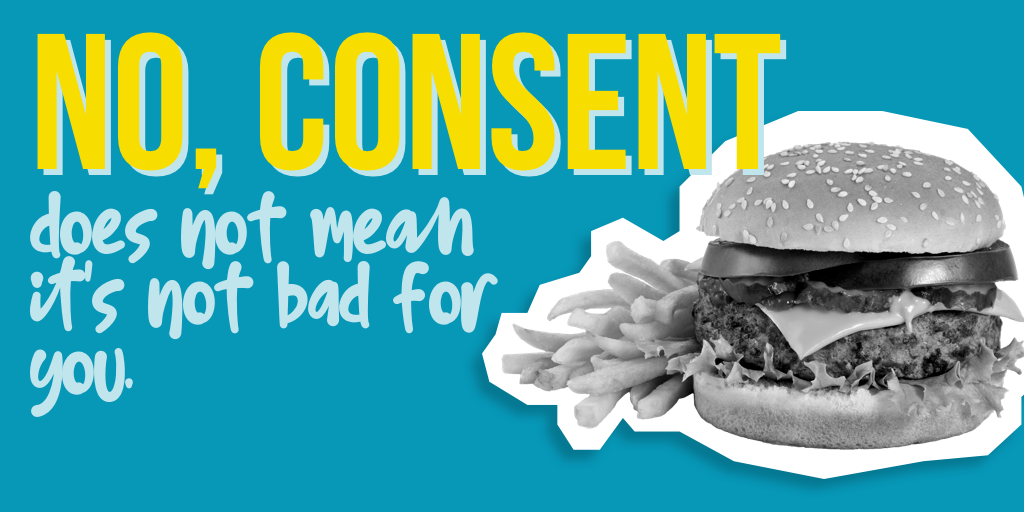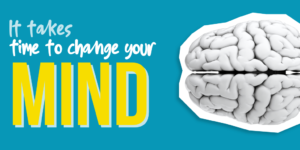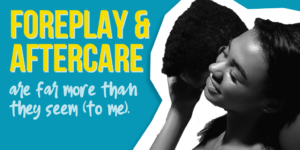Someone on my YouTube channel a couple of weeks ago asked me two questions. Both have been used in conversation with me more than once, and I see them being used to try to trip people up in “debates” over personal lifestyle choices.
I’m tackling the first of those two today:
Do you think consent equates to no harm?
Obviously not.
People say there are no stupid questions. But there are. This is one of them.
Not because of the question itself, but because of the intent. As if proving that harm can come of consent somehow changes the fact that consent is important or allowed—especially for things the asker does not approve of or understand.
That’s not how this works.
That’s not how any of this works.
And I’m going to explain why.
First, what is consent?
Consent is when one person agrees to or gives permission to another person to do something.
Note, that definition does not attempt to claim that every decision will be good. The point of consent is not to be good or to cause no harm.
It is to give/validate personal agency.
Are there different types of consent?
Yes. And I’ll share three types here that I personally feel are important to this conversation.
Implied consent
When surrounding circumstances exist that would lead a reasonable person to believe that this consent had been given, although no direct, express, or explicit words of agreement had been uttered.
Express consent
Permission for something that is given specifically, either verbally or in writing.
Informed consent
Originally and technically a medical term. Both parties are given/have access to important information, including possible risks and benefits, about an activity before making a consent decision.
When I personally talk about consent in my relationships, I am talking about express and informed consent. I do also get implied consent, usually as an ongoing/interim form of consent.
But let’s look at how this works in practice for me.
(NOTE: I’m using myself as an example, because I can say exactly how I do things, and it is the basis of how I teach and think about consent. There are, of course, other valid ways to gain consent and live consensual lives in kink and out of it.)
- I explain who I am, and anything pertinent to the potential relationship activity. This is where the “informed” part of what I do comes in.
- I get express/explicit consent by asking. This is usually, “Are you cool with this?” And making it clear that they can change their mind at any time, “Of course, you are welcome to change your mind, ask questions, or pause things at any time.”
- Often, this is where implied consent comes into play. Once I have express consent, and we grow together, and try new things, there are many things that are implied between us, but all based on that initial conversation.
- Regular check-ins. As a relationship grows and changes, I personally find it useful to have regular check-ins. These might look like, “Are you still enjoying this relationship style?” or “We’ve come a long way in the past few weeks. How are you feeling about what we’ve done together?”
I personally find repeating all of these steps regularly, with additional information shared as it comes up, and express consent gotten for new additions to the activities and relationship always being critical.
What’s the most important part of consent?
FOR A FUNCTIONAL ADULT, the most important part of consent is personal agency.
What is personal agency? I’m going to share a few tidbits from the internet to illustrate:
Personal agency refers to one’s capability to originate and direct actions for given purposes.
…refers to concepts regarding self and others. Children develop understandings that persons have short- and long-term private ends and personal goals. Such understandings coexist with moral judgments and concepts of societal requirements.
The belief or experience that ”I” (agency) am the cause of ”my own” (ownership) thoughts and actions.
Having more agency means taking responsibility for your life.
This is the key, in my view.
The more personal agency a person has in their lives, the more they can personally feel empowered by and take responsibility for.
For example, it is against the law to pay for sex (or sell it) in many states, and has been for years.
Making something against the law does not remove the ability to do it, obviously.
It does remove the ability to do it easily and safely in many cases.
- For people who want and need a safe release with another human to find it.
- For those who sell sex to get the support they need for crimes against them.
- For education about best practices and safety for all participants.
- And so on.
Now, you may or may not agree with legalization. I’ve never paid for sex myself, but I’ve always felt that if people can choose (consent) to sell their bodies in physical labor, they should be able to consent to getting paid for sex. And vice versa.
But I’m more radically for consent and personal responsibility (and have been for most of my life) than most people.
Because I’ve been taught to make decisions for myself and to take responsibility for those decisions. AND, perhaps more importantly, that others have that right as well, and to hold them responsible for their own choices.
(In most cases.)
I’m pretty sure regardless of how you feel about paying for sex (or selling it), you have some similar issue that you have felt your ability to consent/take personal responsibility for has been removed. Or you have issues where you want to remove the right to consent/take responsibility from others.
AND, I 100% know that ALL of you reading this choose to consent to things that are not good for you, and you know it.
Maybe you drink alcohol. Maybe you smoke. Maybe you jaywalk or eat McDonald’s. You probably do kinky things that are against the law in your state, like impact play, anal sex, oral, even adultery (think nonmonogamy).
And that is your right.
Your personal agency.
Does personal agency mean that you won’t be harmed?
And we circle back around.
No.
Of course not.
- You have the right to eat too much for your body. You have the right to risk the consequences.
- You have the right to drink too much (or at all). You have the right to risk the consequences.
- You have the right to stay up past your bedtime. You have the right to risk the consequences.
And now, we’ll come to it.
In relationships, the question boils down to:
Do YOU have the right to choose your relationships with others, based on mutual consent, even if they may harm you in the long run? Yes or no?
And who gets to decide that? Who determines if a relationship is harming you, or may harm you, if not you?
How do we pull this all together?
Good question.
I think it’s going to be different for everyone.
But, in my view (which is the only view I have, LOL!), the key is that the more consent and agency you want for yourself, the more responsibility you must take.
And not just in the end, after the dumpster fire has happened.
But in every step—and that’s where people most often fail.
They take the risks, they ignore the red flags, even the warnings of friends. They break their own boundaries. But they don’t take the responsibility.
They don’t do the research BEFORE trying the things.
They don’t take precautions and keep their eyes open WHILE doing the things.
They just blunder through with blinders on, hoping that things’ll be OK.
And after doing the things, they don’t take responsibility for their choices, because it’s so much easier to blame the other person, when everything they needed to take care of themselves was within their reach, if they’d bothered.
Consent does not equate to no harm.
But just because it could harm does not mean consent doesn’t matter, or that functional adult people should not be allowed to choose the harm they are willing to risk for themselves.
NOTE: Of course, people can consent to abuse, and that does not resolve the abuser of blame. And people can do things to their own bodies that affect others that depend on them, or even strangers. This is a complex issue, for sure, and I’m not trying to offer a magic solution based on black and white thought processes.
What are your thoughts?
Where is the line between what is harmful and what is consensual?
Who gets to make that decision for you, if anyone? And at what point are they overstepping?








